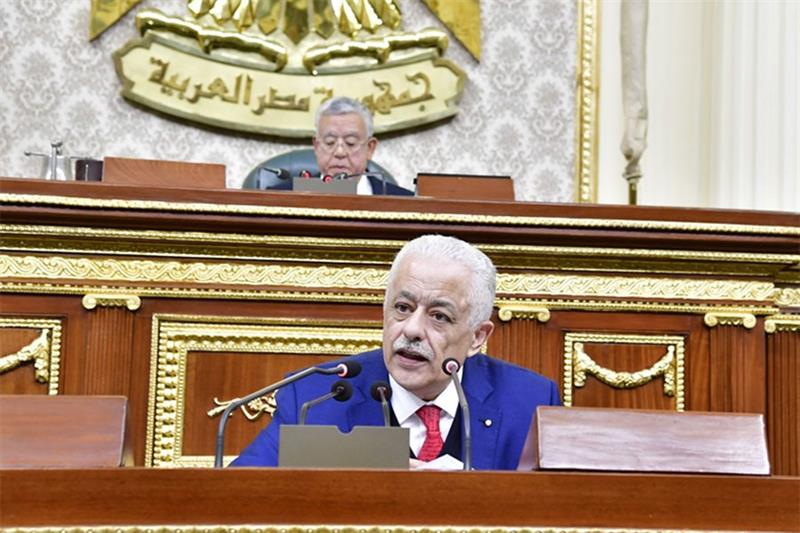
Minister of Education Tarek Shakwi speaks in front of the members of the Egyptian Parliament on Tuesday 28 December, 2021. Ahram
They referred in particular to the fourth grade curriculum in elementary schools, insisting it is very difficult for students to study and for teachers to teach.
MPs also complained that Shawki's "shocking decision" to cancel the division of high school's third year into science and mathematics departments took them by surprise and resulted in confusion for Thanaweya Amma (high school) students and their families.
MP Magdi Seif said most Egyptians have lost confidence in Minister Tarek Shakwi because of his bizarre and shocking policies. Seif also accused Minister Shawki of ignoring the fact that the government schools are in a pressing need for 36,000 teachers, and instead of solving this problem, Minister Shawki took all by surprise by imposing very difficult fourth grade curriculum in elementary schools, a policy which forced families to spend a lot of money on private tutors.
MP Amal Abdel-Hamid also accused Minister Shawki of squandering a lot of public money on buying "tablet computers." "This policy did nothing to reform or advance the agenda of education in Egypt because most schools lack adequate internet infrastructure to be able to use these tablets. It was better for Minister Shawki to employ teachers rather than buy tablets."
MP Amal Zakria complained of the exorbitant fees of private schools. "Though families asked Minister Shawki several times to solve this problem, he did nothing, giving private schools a free hand to double fees as they like," said Zakaria.
MP Hanaa Farouk also charged that the education ministry has increased school fees beyond the financial capacity of low and average-income families.
MP Ali Dessouki accused Minister Shawki of ignoring the problem of overcrowded classrooms. "In the new school year, a classroom includes between 60 and 85 students, and within 10 years this number will increase to 130 students per classroom," said Dessouki.
MPs Maha Abdel-Nasser and Sanaa El-Said also criticized the poor financial conditions of school teachers, the crumbling state of most school buildings, overcrowded classrooms, and the chronic shortage in the number of qualified teachers.
MP Abdel-Nasser said the education ministry should be held responsible for the poor quality of meals offered to students in government schools. "Several students in a number of governorates were taken to hospitals last month after easting poisoned school meals," said Abdel-Nasser.
MP Mohamed Abdel-Aziz criticized Shawki for instructing the ministry not to give books to students unless they pay the school fees first.
Shawki blames ministries of finance and planning for lack of funds
Responding to questions, Minister Shawki insisted that "the fourth grade curriculum is excellent and I advise student families not to worry too much about the exams of the fourth grade." "I advise them to let their sons and daughters learn from the information contained in the school books and understand them as much as possible," said Shawki, adding that "if there is a lack of teachers capable of teaching the fourth grade curriculum, let students turn to education TV channels which teach the curriculum in an excellent way."
Shawki said "his reformist policies" are based on scrapping the old system of memorising and learning by heart. "We do not want students to learn the curriculum by heart in order to be just able to pass the-end-of-the-year exams, but we want a new generation who can understand and gain information," said Shawki, adding that "the objective of the new curriculum is to allow Egyptian students what students in Japan and America learn and understand."
He said "he began his reform policies by modernising the first, second and third grade curriculum in elementary schools." "All the fuss I see right now about fourth grade curriculum is because the books in this grade have a lot of pages," said Shawki.
Shawki also said the education ministry should not be blamed for the shortage of schools teachers. "We are not responsible for not hiring 36,000 school teachers because it is a problem of lack of funding and I think that you should direct your questions in this respect to ministers of finance and planning, and not to the minister of education," said Shawki, revealing that "right now, we are in a dialogue with the ministry of finance and planning on forging a three-year or four-year plan that can solve this problem which is really critical to the education sector."
Shawki also said his ministry is not the institution responsible for distributing "meals" among schools students. "If some complained that some school students received "poisoned school meals" last month, they should direct these questions to the ministry of health," said Shawki, adding that "we do not have official reports about "poisoned meals"." "These meals are offered to as many as 12 million students and we do not have any official reports that any of the students get poisoned because of these meals," said Shawki.
At the end of the debate, speaker Gibali said as many as 140 questions have been directed to minister Shawki about education policies and his responses during today's session will be referred to the House's Education Committee who will file a report.
Short link: